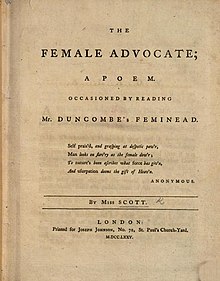Mary Scott (poet)
Mary Scott (1751/52–1793), who became Mary Taylor after her marriage, was an English poet originating from Milborne Port, Somerset. Notable for her literary contributions, Scott authored "The Female Advocate" in 1774, a work advocating for women's participation in writing and literature.

Life and work
Scott's father was a linen draper.[1] Not much else is known about her life before the publication of The Female Advocate, dedicated to her friend Mary Steele, in 1774.[2] Scott credits John Duncombe's The Feminead (1754), a poem in praise of the accomplishments of women writers, as the inspiration for her own poem.
The poem consists of 522 lines of rhyming couplets; it supplements Duncombe's, and discusses more contemporary writers. Among the poets referred to are Lucy Aikin, Anna Laetitia Barbauld, Mary Chudleigh, Sarah Fielding, Anne Killigrew, Catharine Macaulay, Catherine Parr, Helen Maria Williams, and Phillis Wheatley.
Men are also praised: Duncombe; Rev. Thomas Seward, author of The Female Right to Literature, in a Letter to a Young Lady from Florence (1766); William Steele, for his support of his daughter's writing; and Richard Pulteney (1730–1801), a friend and physician who encouraged Scott.
She began a correspondence with Anna Seward, whose father she had praised in The Female Advocate, and Seward's published letters are the source of much that is known of Scott's life.[2] In the preface the Advocate, Scott mentions ongoing ill-health and indeed seems to have been a semi-invalid. She lived with her parents until she was in her thirties, caring for her ailing mother until she died in 1787. Her father died in 1788, and Scott was free after over a decade of courtship to marry John Taylor, a match her mother had opposed when alive.
Scott was part of a circle of Protestant dissenters and was deeply religious;[3] consequently, when her husband, who had formerly convinced her to convert to Unitarianism, embraced Quakerism, she underwent considerable strain. Scott gave birth to a daughter in 1789 and a son in 1791 (her son, John Edward Taylor, went on to found the Manchester Guardian).[4] She died late in her third pregnancy, in 1793, at the age of forty-one.[5]
Works
- Scott, Mary (1775). The Female Advocate; a poem occasioned by reading Mr. Duncombe's Feminead. London: Joseph Johnson. Retrieved 2 March 2015.
- "Verses Addressed to Miss Seward, on the Publication of her Monody on Major André," The Gentleman's Magazine (June 1783)
- The Messiah. A Poem, in Two Parts. Published for the benefit of the General Hospital at Bath ([Bath]: R. Cruttwell, 1788.)
References
- ^ Mullan, John. "Scott [married name Taylor], Mary". Oxford Dictionary of National Biography (online ed.). Oxford University Press. doi:10.1093/ref:odnb/45861. (Subscription or UK public library membership required.)
- ^ a b Whelan, Timothy (2014). "Mary Scott, Sarah Froud, and the Steele Literary Circle: A Revealing Annotation to The Female Advocate". Huntington Library Quarterly. 77 (4): 435–452. doi:10.1525/hlq.2014.77.4.435. JSTOR 10.1525/hlq.2014.77.4.435.
- ^ Ferguson, Moira (1995). Eighteenth-Century Women Poets: Nation, Class, and Gender. SUNY Press. p. 2. ISBN 9781438402628.
- ^ . Dictionary of National Biography. London: Smith, Elder & Co. 1885–1900.
- ^ "Scott, Mary (1751-93)". Nonconformist Women Writers. Retrieved 4 July 2022.
Bibliography
- Blain, Virginia, et al., eds. The Feminist Companion to Literature in English. New Haven and London: Yale UP, 1990.
- Buck, Claire, ed. The Bloomsbury Guide to Women's Literature. Prentice Hall, 1992.
- Lonsdale, Roger ed. Eighteenth-Century Women Poets. New York: Oxford University Press, 1989.
- Mullan, John. “Scott , Mary (1751/2–1793).” Oxford Dictionary of National Biography. Ed. H. C. G. Matthew and Brian Harrison. Oxford: OUP, 2004. 16 Apr. 2007.
- Sitter, John, ed. (2001). The Cambridge Companion to Eighteenth-Century Poetry. Cambridge University Press. ISBN 9780521658850. Retrieved 3 March 2015.
- Todd, Janet, ed. British Women Writers: a critical reference guide. London: Routledge, 1989.
- Wikipedia articles incorporating a citation from the ODNB
- Pages using cite ODNB with id parameter
- Articles incorporating Cite DNB template
- Articles with short description
- Short description matches Wikidata
- Use dmy dates from March 2018
- Articles with FAST identifiers
- Articles with ISNI identifiers
- Articles with VIAF identifiers
- Articles with WorldCat Entities identifiers
- Articles with J9U identifiers
- Articles with LCCN identifiers
- Articles with NTA identifiers
- Articles with SUDOC identifiers
- 1751 births
- 1793 deaths
- People from Somerset
- English women poets
- 18th-century British women writers
- 18th-century British writers
- 18th-century English women writers
- 18th-century English people